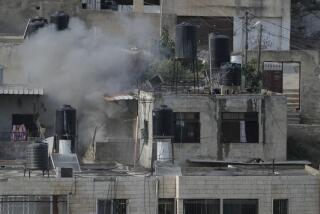Israeli Vows Army Won’t Become ‘Mob’
- Share via
JERUSALEM — Gen. Amram Mitzna, military chief of the occupied West Bank, ordered his senior troop commanders Sunday to watch television news tape showing soldiers brutalizing Palestinian prisoners and then told them he will not let the Israeli army become “a mob force.”
At the same time, the army announced that three soldiers will be court-martialed on charges of burying alive four young Arabs earlier this month near the West Bank village of Kfar Salim. The Arabs were later rescued.
The harsh TV tape and the burial incident, along with other news reports of excessive force used by Israeli soldiers, have drawn widespread condemnation from other nations and from dozens of human rights groups and have made many senior military officers extremely sensitive to charges of brutality, Mitzna among them.
Forced to Watch Tape
He forced his field commanders to watch all 40 minutes of the uncut CBS tape, not just the 60 seconds originally shown on U.S. television. What they saw was graphic footage of four Israeli soldiers beating two handcuffed demonstrators with fists, boots, clubs and stones.
Afterward, a military source said, Mitzna refused to let any of the other officers make comments and told them that nothing like that was to happen in the future. He also announced that the four soldiers have been arrested and will be prosecuted and that their commanding officer, an unnamed captain, has been suspended from duty.
Meanwhile, the deaths of two more Palestinians were reported, raising to at least 74 the number of Arab fatalities in the West Bank and Gaza Strip since a Palestinian uprising against the Israeli occupation began Dec. 9.
Palestinians Identified
Raed Barghouti, 17, and Ahmed Barghouti, 22, were shot to death Saturday night during a clash involving rock-throwing rioters and Israeli settlers at the Arab village of Abud, about 10 miles northwest of Ramallah in the West Bank.
An army spokesman said the men were killed when three residents of a nearby Jewish settlement chased demonstrators who had stoned their car on a road through Abud.
According to military police investigators, a settler shot one protester who had just struck another settler in the head with a board. The third settler told military police that his gun went off accidentally, killing the other Palestinian.
The army spokesman said that one settler was arrested and that a second was still under investigation.
Spate of Incidents
Although the army described Sunday as a relatively quiet day, visits by journalists to West Bank areas around Hebron and Abud showed a nearly continual spate of demonstrations, rock throwing and setting up of roadblocks, even though few serious confrontations were reported.
The daily level of protest has risen so high that what seemed shocking a month ago now seems almost commonplace, and it appears to take extraordinary behavior by the army to arouse attention here.
The burial and subsequent rescue of the four Arab youths and the treatment of two unresisting prisoners as shown in the CBS tape are two such episodes.
Condemnation from the international community has been great, with Foreign Ministry officials acknowledging that Israeli embassies and consulates abroad have been flooded with complaints, including many from leading American Jewish figures.
Also, the CBS tape has pushed an already polarized Israeli government and public even further apart. The government-operated Israeli Television Authority authorized the broadcast of a censored version of the tape only after it had been shown in the United States and Europe and even though the camera crew was Israeli.
Even the censored version was too much for some Israelis. Three Cabinet ministers, all members of Prime Minister Yitzhak Shamir’s right-wing Likud Bloc, called for journalists to be barred from the occupied territories on grounds that reporters are causing the riots.
“I came to the conclusion after 80 days of riots that the presence of the media causes the riots,” Labor Minister Moshe Katzav said after Sunday’s regular Cabinet meeting. “If the media is not there, I don’t think there will be any more riots.”
Mother Blames Army
The mother of Sgt. Saguy Harpaz, one of the four soldiers arrested for the beating shown on the TV tape, said the incident involving her son is the fault of the army.
“I taught my son to go to the army with his head held high, to contribute and to protect, and what has happened here? He has become a beater of children and women.”
Mitzna and other senior officers have insisted that episodes of brutality and other excesses are exceptions to a clear and defined policy that prohibits beatings or other force after a demonstration has been stopped or someone is arrested.
Yet, in spite of continual reiteration of this policy, complaints continue in such great volume that the Israeli attorney general has directed the government to make it clear that not only are orders to beat unresisting or arrested people illegal but that a soldier is bound by law to disobey such orders.
Nevertheless, some soldiers and military experts think the signals against such activities are still too vague.
More to Read
Sign up for Essential California
The most important California stories and recommendations in your inbox every morning.
You may occasionally receive promotional content from the Los Angeles Times.












